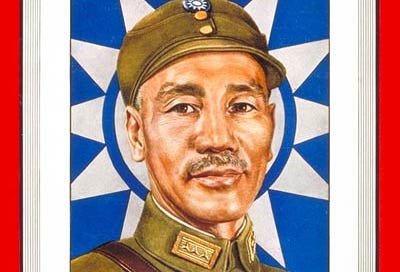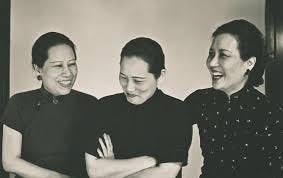Prior to Mao, the Soong family went a long way to define China from the early 20thcentury. The father, American-educated Methodist minister Charlie Soong, became one of the richest men in China in banking and printing. He had 3 famous daughters, Soong Ai-ling, Soong Ching-ling, and Soong Mei-ling, all of whom went to Wellesley College. Exerting power in the backgound, each of them married into the highest political circles, respectively Kung Hsiang Hsi (the richest man in China), Sun-Yat Sen (the greatest early political leader), and Chiang Kai-shek (who became the premier nationalist as he united most of China as a military leader in the 1920s-30s).
This is an excellent, though highly partisan, look at the Soong family in all of its machinations. It has great scholarly value in that its suppositions are based on documents that were unearthed by the Freedom of Information Act from the FBI and other groups that investigated the shady dealings of the Soongs, much of it for various American politicians. The result is a convincing argument, in my view, that: 1) the Soongs (with one exception) were brutal thugs bent on power and money with little regard to the welfare of the people of China; 2) General Chiang was from the start the creature of the Green Gang gangsters, the only constant loyalty he exhibited in a life of vacillation and corruption; 3) many Americans, from the Luces to Wendall Willkie (though not FDR or Truman), were their dupes.
Because of the new documentary sources, this argument gains new relevance. It is both sad and pathetic to see how Americans deluded themselves, eventually at the cost of millions of Chinese lives, to pursue the crude PR illusions that the charming Soongs and Chiang Kai Shek spun.
Only one of the three Soong sisters, Ching-ling, comes off well; after the death of Sun-Yat Sen, she stayed in China and devoted her life to the Communist Party. As they said: "one of them loved money, one of them loved power, and one of them loved China." It is a truly devastating indictment.
There are a lot of things that this book is not, and one of them is a "balanced view" that advances counter arguments for the other opinion, that is, Luce's and others like him. Thus, it will appear biased to some. It also does not present an overview of the historical period, sticking instead to its principal argument; if the reader lacks a general idea, the book is far less valuable as an intro to China's development at a complex and fraught time. That means this book is really in the province of scholars and their arguments, which are beyond my interest in many respects. Finally, this is not an in-depth psychological biography. You don't feel like you get to know who they were and why the acted the way they did, that is, beyond greed and the will to absolute power.
Recommended for all serious students of China. There is not a single page of this book that is dull, whether or not you believe the perspective of the author.






I just finished reading Big Sister, Little Sister, Red Sister about these three women. That was a very interesting book too!